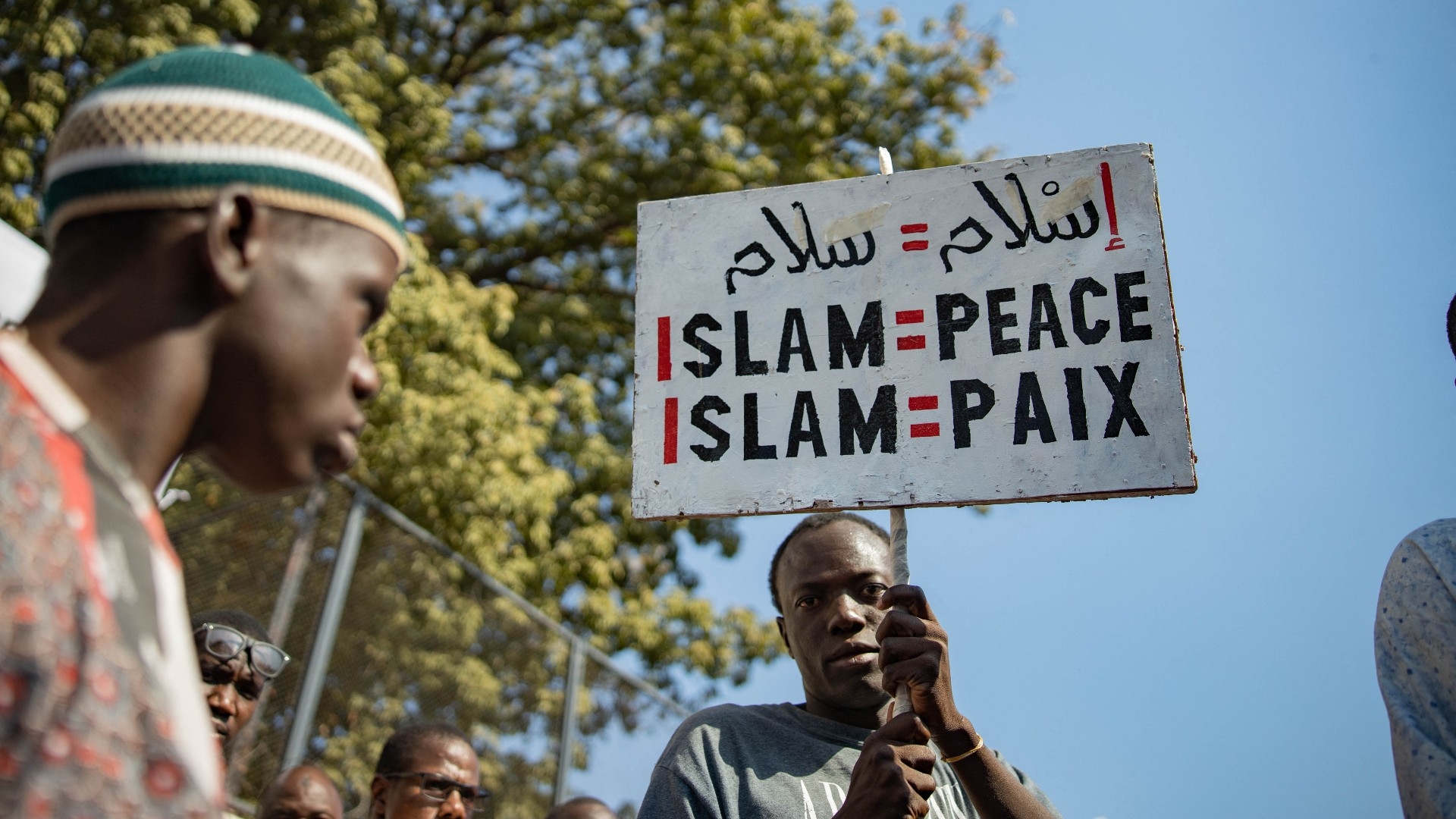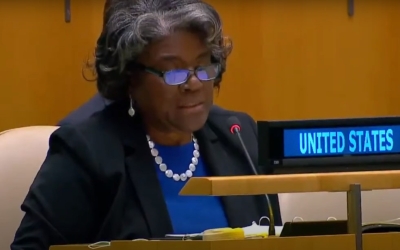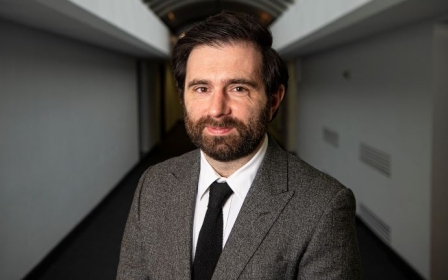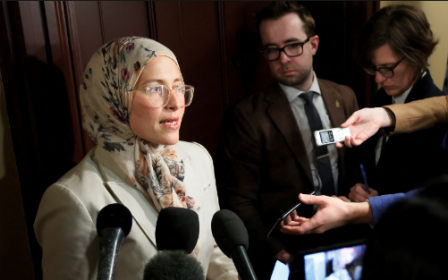Combat Islamophobia day explained: The new UN event, backed by China

The first International Day to Combat Islamophobia will be marked on Wednesday, following a United Nations unanimous resolution adopted last year.
The resolution designated 15 March as a new annual day of observance for tackling hatred and prejudice towards Muslims.
Suspicion, discrimination, and hatred towards Muslims have risen to "epidemic proportions", according to a 2021 report by the UN special rapporteur on freedom of religion.
The resolution was co-sponsored last year by over 60, mostly Muslim-majority, countries.
Although no countries officially voted against its adoption, France and India spoke against the resolution.
New MEE newsletter: Jerusalem Dispatch
Sign up to get the latest insights and analysis on Israel-Palestine, alongside Turkey Unpacked and other MEE newsletters
Meanwhile, China's decision to back the international day has drawn condemnation from Uyghur activists and led to a clash with Washington at a UN event at the General Assembly to mark the new day.
Here's what you need to know about the adoption of the new UN observance.
Why did it come about?
The resolution was adopted due to increased instances of hatred towards Muslims around the world, which has manifested in the form of violence, hate speech, and discriminatory practices.
The date 15 March was chosen to coincide with the anniversary of the 2019 attack on two mosques in New Zealand which left 51 people dead.
The attack was carried out by lone gunman Brenton Tarrant, who was armed with assault rifles and shotguns and dressed in camouflage gear.
A manifesto posted by Tarrant to the 8chan internet forum hours before the attack outlined a desire to strike at the heart of a tiny Muslim community on the edge of the world, in order to send a message globally.
“Since the tragedy of 9/11, animosity and institutional suspicion of Muslims and Islam across the world have only escalated to epidemic proportions,” said Bilawal Bhutto Zardari, foreign minister of Pakistan, who co-convened the UN event.
“A narrative has been developed and peddled which associates Muslim communities and their religion with violence and danger.
“This Islamophobic narrative is not just confined to extremist, marginal propaganda, but regrettably has found acceptance by sections of mainstream media, academia, policymakers, and state machinery.”
Commemorating the event, UN Secretary-General Antonio Guterres said on Friday that two billion Muslims worldwide “often face bigotry and prejudice for no other reason than their faith”.
He cited “socio-economic exclusion, discriminatory immigration policies, and unwarranted surveillance and profiling” as structural manifestations of anti-Muslim hatred which needed to be confronted.
He also spoke of “biased media representations” and “the anti-Muslim rhetoric and policies of some political leaders”.
Who supported and opposed it?
The resolution was introduced in March 2022 by Pakistan’s UN envoy Munir Akram, on behalf of the Organisation of Islamic Cooperation (OIC).
It was co-sponsored by 55 mostly Muslim-majority countries in the OIC, including Afghanistan, Bangladesh, Egypt, Malaysia, Saudi Arabia, and Turkey.
During the general assembly session on the resolution, a further eight countries were added as co-sponsors: China, Cuba, Nicaragua, Philippines, Russia Uruguay, Venezuela, and Syria, the latter of which has been suspended from the OIC due to human rights violations during the ongoing civil war.
Notably, New Zealand, was not a co-sponsor of the resolution despite the day coinciding with the Christchurch attacks.
France and India - both of whom have faced accusations of Islamophobia by their own Muslim communities - objected to the creation of the international observance.
Describing the resolution as “unsatisfying” and problematic, Nicolas de Riviere, the French permanent representative to the UN, told the General Assembly last year that France supported the protection of all religions and beliefs but questioned the singling out of a specific religion.
“The term Islamophobia has no agreed-upon definition in international law, unlike the freedom of religion or conviction. But it’s this liberty that France defends, as well as all the other public freedoms, such as the freedom of expression or conviction,” said de Riviere.
India’s permanent representative TS Tirumurti called on the UN to condemn “religiophobias” rather than singling out Islamophobia, citing discrimination against Hindus, Sikhs, and Buddhists.
Ultimately, neither France or India opposed the adoption of the day by consensus, despite speaking against the motion.
China draws condemnation
China’s decision to co-sponsor the day has drawn strong condemnation from Uyghur activists, who accuse Beijing of waging a campaign of genocide against the Turkic Muslim minority in the west of the country.
Dolkun Isa, the head of the World Uighur Congress, a German-based advocacy organisation, told MEE: “Given the Chinese government’s brutal repression of Uyghur Muslims, and its war against Islam in general, China’s co-sponsorship is highly paradoxical.
"If China seriously wants to combat Islamophobia, it should first look at its own policies and the persecution of Uyghur Muslims.”
Muslim-majority countries belonging to the OIC have been largely silent on the issue of Uyghur persecution.
Many, including Gulf states, have instead cultivated closer economic and diplomatic ties with Beijing.
Ahead of the Islamophobia international day, Linda Thomas-Greenfield, the US ambassador to the UN, said that the US had formally recognised that Muslims are increasingly subject to “discrimination and violence”, and cited the treatment of the Uyghurs in China and the Rohingya in Myanmar.
“We have also determined that the Chinese government has committed genocide and crimes against humanity against the predominantly Muslim Uyghurs and other ethnic and religious minority groups in Xinjiang,” she said.
“The international community must continue to condemn these atrocities. We must continue to demand accountability.”
The Chinese ambassador to the UN accused the US of “abusing” the UN event and seeking to sow discord between China and Muslim countries.
“We call upon America to stop making lies for their political interests. The whole world has long been clear-eyed about the US political agenda of using Xinjiang to condemn China,” a spokesperson for the delegation said.
Middle East Eye delivers independent and unrivalled coverage and analysis of the Middle East, North Africa and beyond. To learn more about republishing this content and the associated fees, please fill out this form. More about MEE can be found here.






